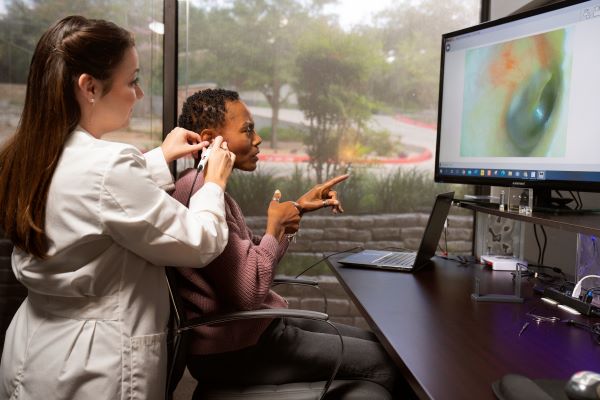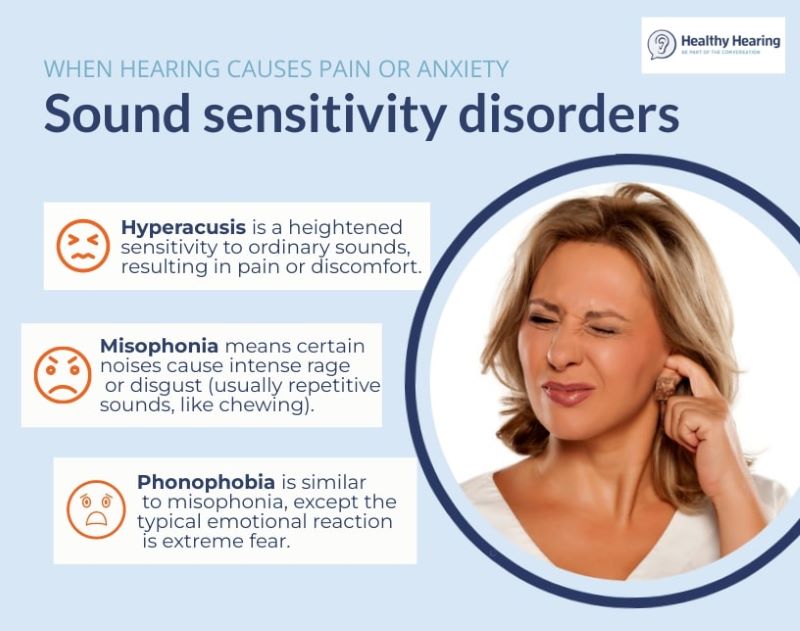|
www.HealthyHearing.com |
What is reactive tinnitus?When external noises trigger or worsen ringing in the ears
Contributed by Corey Whelan Tinnitus (ear ringing) is the perception of phantom sound that doesn’t have an external cause. If you have tinnitus and noises in your environment seem to affect the intensity, you may have what's known as reactive tinnitus. “Reactive tinnitus is a form of tinnitus that changes in loudness, quality, or pitch, in response to average or even low-level noise,” explains Dr. Brian Taylor, AuD, Senior Director of Audiology at Signia. It can cause phantom sounds that range from mildly louder than usual to screamingly intense. Luckily, this uptick is typically temporary. If you’re struggling with reactive tinnitus, take a deep breath and read on. We’ll provide information about the causes of this condition, as well as treatments that can help.
What causes reactive tinnitus?Reactive tinnitus is triggered by average, everyday sounds at almost any volume. So, crickets chirping can be just as much of a culprit as car alarms that won’t stop blaring. Reactive tinnitus is often associated with hyperacusis, a separate audiological condition that causes extreme sensitivity to sounds of low or average volume. A 2021 study published in Frontiers in Neurology reported that 30% - 50% of people with tinnitus also have a sound sensitivity disorder. People with hyperacusis may find low-to-average noises uncomfortable, or even painful to hear. The exact, physiological mechanism connecting hyperacusis to reactive tinnitus is not completely known, but blockages that affect the nervous system are thought to be at fault. “The underlying problem in hyperacusis and reactive tinnitus is thought to be an increase in neural inhibition or activity, in response to various stimuli,” says Dr. Taylor. Other conditions, such as phonophobia (fear of loud sounds) and misophonia (sounds that trigger emotional or physiological reactions) may also play a role. As with so many aspects of tinnitus, more study is needed to determine the impact of these issues.
How does reactive tinnitus differ from other forms of tinnitus?Some people never notice any changes in the tinnitus sounds they hear. Many, if not most people with this condition experience habituation, and a lessening of their perception of tinnitus over time. If you have reactive tinnitus, the opposite occurs when you hear triggering noise. While similar, reactive tinnitus is different from somatic tinnitus, which is ear ringing triggered by movements in the head or neck. What triggers it?There are many external and internal triggers that might alter the way you perceive tinnitus sounds. Stress, a rough night of tooth grinding, medications you take, or simply paying more attention to the “noise in your ears” can all play a role. Despite all of these potential triggers, reactive tinnitus is only defined as tinnitus that is worsened by average-sounding noise. How is reactive tinnitus diagnosed?There is no imaging or laboratory test that can be used to diagnose reactive tinnitus. Like all forms of tinnitus, reactive tinnitus is largely diagnosed through an oral history of symptoms. To assess whether you have reactive tinnitus, your healthcare provider will want to know about your sound sensitivity level, and the types of noises that bother you most. The Sound Sensitive Tinnitus Index (SSTI), a self-reporting questionnaire, may be used for this purpose. The Loudness Discomfort Level Test used to calibrate hearing aids also may be recommended. Keep in mind that this test may “set off” reactive tinnitus in some people. Before taking it, talk to your healthcare provider about your concerns, so you can determine if its value outweighs its potential risk. 
such as impacted ear wax. A specialist, such as an otolaryngologist or audiologist, will check for any underlying physical issues, and can remove ear wax buildup, which might be at fault instead of external noise. They’ll also ask about changes in lifestyle, such as taking a new medication that is ototoxic, which might be triggering a volume uptick or pitch change. Since tinnitus is highly associated with hearing loss, your hearing will be tested during an audiological exam. Make sure to let your doctor know if you’ve recently been diagnosed with a new condition, including infections such as Lyme disease, diabetes, or thyroid disease. These types of changes are not specific to reactive tinnitus, but may be exacerbating risk factors, for some people. Treatments and solutions that can helpAfter the intruding noise stops, most people return to baseline tinnitus sound within minutes, hours, or days. Some people, however, continue to experience a volume uptick for longer periods of time. No matter how long it lasts, staying calm will help you maintain a sense of control. Hearing protectionIf you’re able to identify the specific sounds that spark reactive tinnitus for you, avoid them if you can. If not, prepare yourself with protective devices, like noise-canceling headphones or earplugs, that reduce your level of exposure. Hearing aid settingsIf you wear hearing aids, talk to your audiologist about the volume settings that make the most sense for you. Auditory input is essential for maintaining optimum hearing and enjoying life. A too-loud volume, however, may set reactive tinnitus off. With practice, you’re bound to find the right level. Tinnitus sound therapyDIY tinnitus treatments, like using masking apps, may exacerbate, rather than help reactive tinnitus for some people. In contrast, tinnitus sound therapy that retrains the brain with sound may be highly beneficial. Tinnitus retraining therapy (TRT) is effective for reducing most forms of tinnitus and hyperacusis. TRT combines sound therapy with counseling. During TRT, you will wear a device behind your ear that generates specific types of sound. This diverts your brain’s attention away from tinnitus sounds, which neutralizes them. Over time, your brain learns to ignore and not be threatened by the uptick in reactive tinnitus noise. You also will be guided toward reducing your emotional reaction to external triggering sounds. Your brain learns to reclassify these sounds into neutral forms of stimuli that don’t trigger or bother you. A 2015 retrospective review of TRT found that clear improvement from this therapy can be realized within one month of starting treatment. Don’t let reactive tinnitus stop you from going out and doing the things you love. This condition may not be curable, but it is treatable. With a trial-and-error approach and a calm outlook, you will find solutions that provide relief, and keep you in the game of enjoying life. Corey WhelanCorey Whelan is a freelance health writer and patient advocate based in New York. She specializes in medical content about reproductive health, cancer, hearing health, and menopause. Whelan lives with two fascinating people who happen to be her children and two extremely silly rescue dogs. |
Featured clinics near me
Earzlink Hearing Care - Reynoldsburg
7668 Slate Ridge Blvd
Reynoldsburg, OH 43068

Find a clinic
We have more hearing clinic reviews than any other site!



